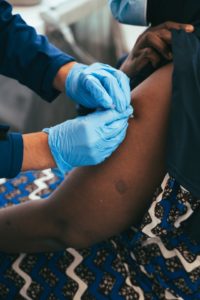
2021 Lister Fellow Professor Ravi Gupta and his colleagues have recently published their latest research into HIV drug resistance. In a separate pre-print, Ravi also presents his latest work exploring COVID-19 vaccine responses in African populations.
HIV drug resistance can spread between viruses
As described in the paper, HIV-1 Evolutionary Dynamics under Nonsuppressive Antiretroviral Therapy, Ravi and colleagues found that drug resistant mutations can ‘spread’ between HIV viruses within a person’s body.
In response to this work, the authors urge trials of therapies in combination – particularly in immune compromised individuals hosting long-term infections and who are thus at greatest risk for developing and harbouring drug resistant HIV variants.

Forms of drug resistant HIV are emerging around the world. All antiretrovirals currently used against HIV are at risk of becoming partially or completely inactive, due to steadily increasing levels of HIV drug resistance. This jeopardises the efficacy of drug treatment for HIV.
Ravi and his colleagues set out to study HIV-1 evolution within individuals who were unable to suppress the virus with antiretroviral therapies. This was mainly as a result of sub-optimal adherence to treatment, as drug levels in blood were measured and often low.
Over periods of a year or more, they observed significant changes in viral populations within individuals, with large fluctuations in synonymous and nonsynonymous variant frequencies, despite a stable level of virus in the bloodstream.
Reconstructed haplotypes provided evidence for selective sweeps during periods of partial adherence, and viral haplotype competition (mixing), during periods of low drug exposure.
Drug resistance mutations were used as markers of haplotypes, and their distribution over time indicated recombination. They independently observed linkage disequilibrium decay, indicative of recombination. Thus, drug resistance mutations can ‘spread’ between viruses in a person.
They also conclude that these processes of drug resistance are not unique to HIV and could result in the development of drug resistance by other viruses, including SARS-CoV-2.
Booster vaccine doses against SARS-CoV-2 needed in Africa

In collaboration with The Nigerian Institute for Medical Research, Ravi’s latest paper, Antibody responses to AZD1222 vaccination in West Africa, examines immune responses to the AstraZeneca COVID-19 vaccine.
This is a hugely understudied area. They found that almost half of participants in the study (62 out of 140) had been infected with SARS-CoV-2 before being vaccinated. Of the 49 participants followed further, half had the N antibody. Half of those who did not have this antibody had neutralising activity and the S antibody present before receiving the vaccine.
After the vaccine (at a time when the Delta variant was in circulation), they analysed the levels of antibodies in individuals against Delta and Omicron variants. They found that having COVID-19 before vaccination provided a boost in protection.
Immune responses to the Omicron variant were low after three months, suggesting that booster doses should be considered for those at high risk in Africa even if they have contracted the virus.
Ravi Gupta works between the Africa Health Research Institute in Durban, South Africa, and the UK. Since 2019, he has been Professor of Clinical Microbiology at the Cambridge Institute for Therapeutic Immunology and Infectious Diseases.
You can find out more about his lab’s research on their website.



